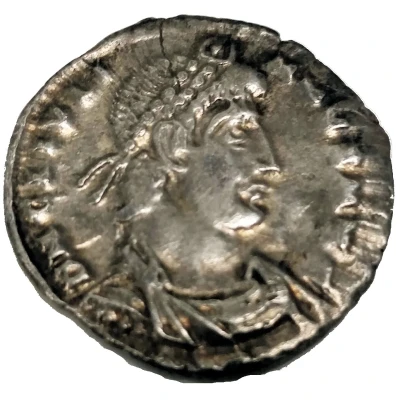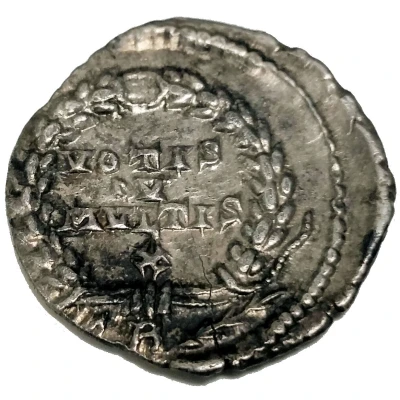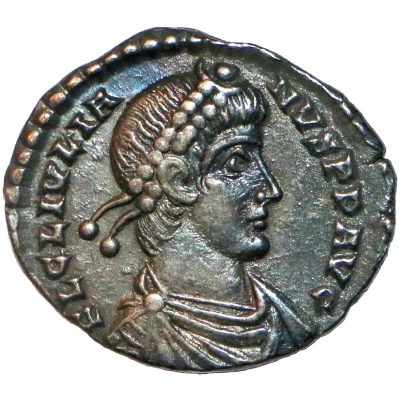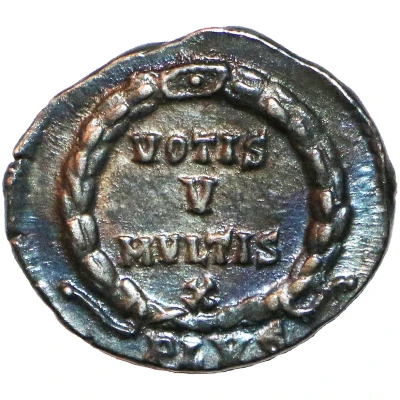


© disha41754 (CC BY)
Siliqua - Julianus II VOTIS V MVLTIS; Treveri
| Silver | 2.5 g | 17 mm |
| Issuer | Rome › Roman Empire (27 BC - 395 AD) |
|---|---|
| Emperor | Julian (360-363) |
| Type | Standard circulation coin |
| Years | 360-363 |
| Value | Siliqua (1⁄24) |
| Currency | Solidus, Reform of Constantine (AD 310/324 – 395) |
| Composition | Silver |
| Weight | 2.5 g |
| Diameter | 17 mm |
| Shape | Round (irregular) |
| Technique | Hammered |
| Orientation | Coin alignment ↑↓ |
| Demonetized | Yes |
| Updated | 2024-10-04 |
| Numista | N#102747 |
|---|---|
| Rarity index | 90% |
Reverse
Four lined legend within wreath
Mintmark and palm branch in exergue
Script: Latin
Lettering:
VOTIS
V
MVLTIS
X
TR
Comment
Julian (Latin: Flavius Claudius Iulianus Augustus, Greek: Φλάβιος Κλαύδιος Ἰουλιανὸς Αὔγουστος; 331/332[2] – 26 June 363), also known as Julian the Apostate was Roman Emperor from 361 to 363, as well as a notable philosopher and author in Greek.A member of the Constantinian dynasty, Julian became Caesar over the western provinces by order of Constantius II in 355 and in this role campaigned successfully against the Alamanni and Franks. Most notable was his crushing victory over the Alamanni in 357 at the Battle of Argentoratum (Strasbourg), leading his 13,000 men against a Germanic army three times larger. In 360 in Lutetia (Paris) he was proclaimed Augustus by his soldiers, sparking a civil war between Julian and Constantius. Before the two could face each other in battle, however, Constantius died, after naming Julian as his rightful successor. In 363, Julian embarked on an ambitious campaign against the Sassanid Empire. Though initially successful, Julian was mortally wounded in battle and died shortly thereafter.
https://en.wikipedia.org/wiki/Julian_(emperor)
The emperor Julian the Apostate was gracious to Hillel II https://en.wikipedia.org/wiki/Hillel_II, Nasi of the ancient Jewish Sanhedrin between 320 and 385 CE, traditionally regarded as the creator of the modern fixed Hebrew calendar, whom he honored on a number of occasions. In an autograph letter to him, Julian assured him of his friendship and promised to ameliorate further the condition of the Jews. Before setting out for the war with Persia, Julian addressed to the Jewish congregations a circular letter in which he informed them that he had "committed the Jewish tax-rolls to the flames," and that, "desiring to show them still greater favors, he has advised his brother, the venerable patriarch "Julos", to abolish what was called the 'send-tax'".
Interesting fact
The Julianus II Siliqua coin was minted during the reign of Emperor Julian the Apostate, who was known for his attempts to restore paganism as the dominant religion of the Roman Empire. Despite this, the coin still bears the traditional Roman imperial motto "VOTIS V MVLTIS" which means "with the votes of many" or "by the will of many", indicating that the coin was minted with the support and approval of the Roman Senate and people. This blend of Christian and pagan elements on the coin reflects the complex religious and political landscape of the Roman Empire during Julian's reign.

